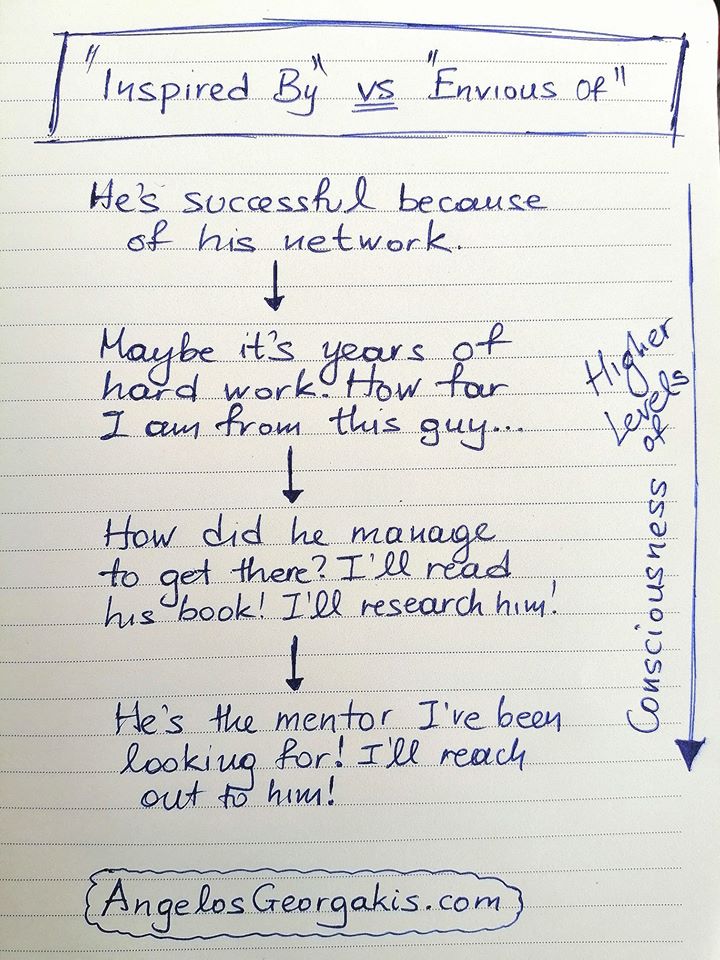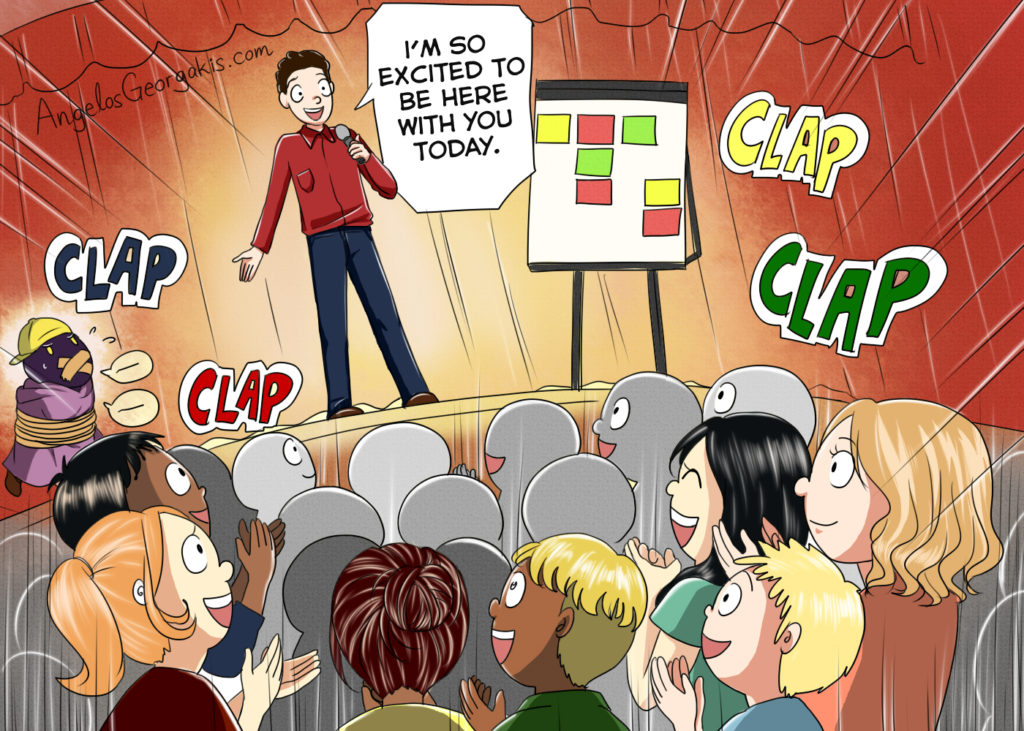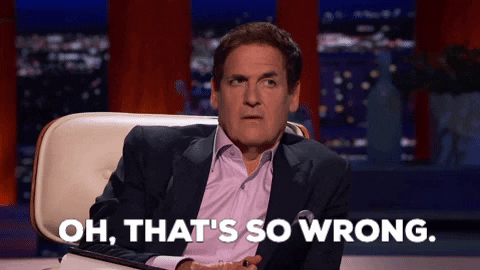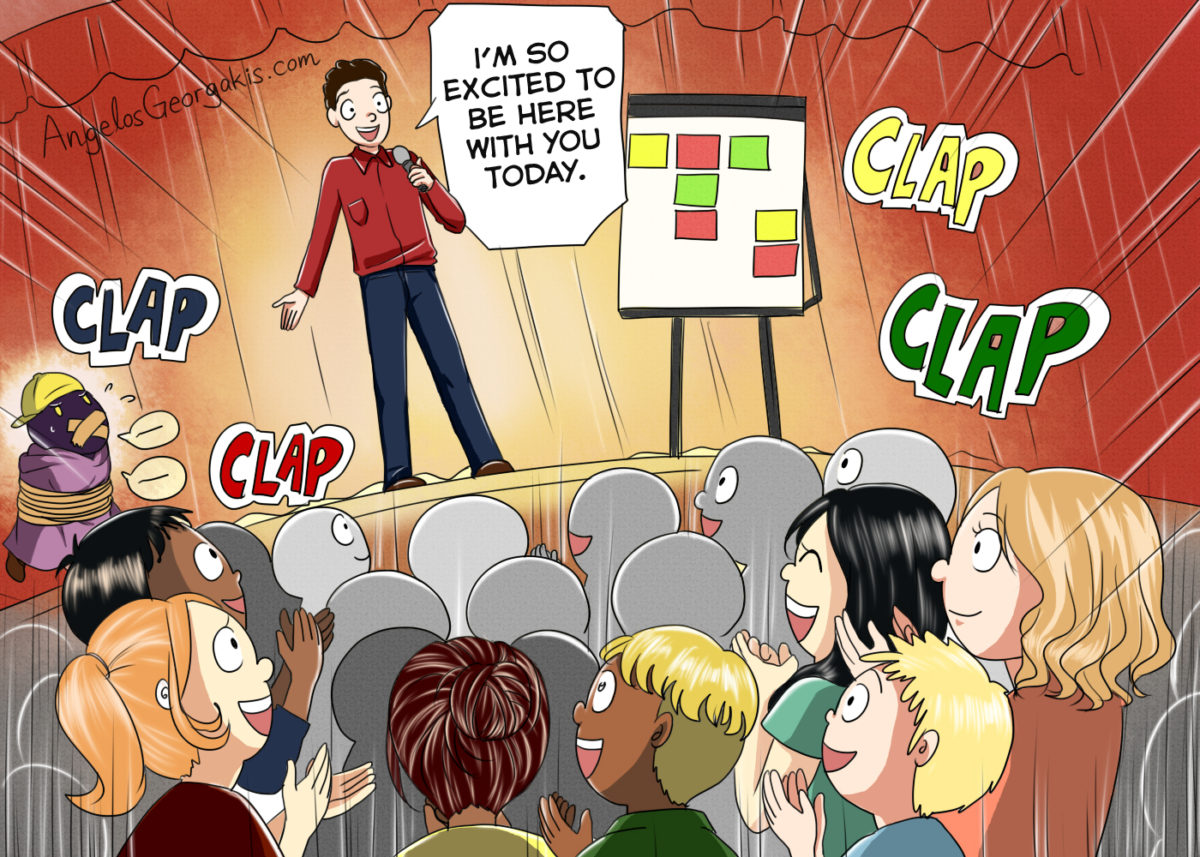As a coach and entrepreneur, I’ve noticed that anxiety in entrepreneurs is often triggered by a series of inner battles between two opposing selves—a higher self and a lower self:
- The lower entrepreneurial self: That’s the “selfish” part of us that wants quick success, lots of $$$, status, recognition, instant gratification, security, and stability.
- The higher entrepreneurial self: That’s the altruistic, generous, patient and noble part of us that prioritises serving others, looks for meaning and strives for impact.
Although most mentors and coaches may “force” you into your higher self, my experience shows me that accepting and negotiating as much as possible with your lower self can lead you to success faster.
Understanding human nature and working with it can take you further than trying to change it.
As my friend, award-winning psychotherapist Efrat Ginot PhD, says, “People come to my office asking if I can help them kill their anxiety forever. That’s like asking if you can live without lungs.”
That’s my approach to anxiety too. Anxiety stops becoming a problem when you stop fighting it.
My 10 distinctions will help you to:
- learn to work with your emotions
- fully accept who you are and what you want
- reduce your anxiety
- build self-awareness
- move towards your higher entrepreneurial self with less friction
Table of Contents
#1 – Serving Others vs. Myself
I’ve found that the most popular (and right) advice for entrepreneurs can often be the #1 cause of their anxiety.
As an entrepreneur, I bet you’ve been given advice such as:
- “Give value first”.
- “Do good work and don’t expect anything back”.
- “Serve; don’t sell”.
- “You have to give in order to get in business”.
This is all great advice.
If you do all this, you’ll probably get rewarded.
But what happens until you get rewarded?
What about the daily hustle, frustration, stress, anxiety, financial insecurity, doubt, and failure?
- An entrepreneur also has bills to pay while working on a problem that is going to change the world.
- An entrepreneur may have kids.
- An entrepreneur also has to put bread on the table.
- An entrepreneur has his or her “egoistic” needs and wants that have to be addressed.
- An entrepreneur is another human being who gets immense pleasure by helping other human beings but is also hardwired evolutionarily to look after himself or herself.
You are part of the service, too.
To put it simply:
You can’t serve others if you don’t serve yourself first.
Unconditional love and service don’t come naturally; they take practice.
Giving love is a muscle that you have to work out.
Otherwise, Buddist monks wouldn’t have to do all this inner work and put all these hours of meditation to reach their higher self.
Entrepreneurs who over idealise this concept of service and ignore their own needs create friction—a constant inner battle that triggers anxiety.
If you want to:
- make a lot of money fast
- get your hands on a Ferrari
- achieve status
- build authority and get millions of followers…
… that’s perfectly fine!
Acknowledge everything your ego demands.
It’s OK to want all this. No need to feel guilty.
And if you don’t feel like giving value today, accept it.
Give yourself a break and come back to give value tomorrow.
The guilt of not being a natural Mother Teresa creates so emotional pain and anxiety in entrepreneurs.
Embrace all your thoughts, wants and emotions first. Then go serve your higher purpose; give; open your hands.
You can’t serve others if you forget yourself.
Your anxiety, as a good friend, will always be there to remind you of that.
#2 – Instant vs. Delayed Gratification
Humans are not designed to work on something that gives them no joy for the next five or ten years.
Anxiety will knock on your door, “Hey buddy, I’m not going to let you die on the land of future and unguaranteed success. I want you to have fun today!”
Because human beings are also hardwired for pleasure and survival.
Your unconscious brain thinks, “If this guy only works and gets no joy, he’s not going to survive”.
This is what James Clear says in his book Atomic Habits:
Most people know that delaying gratification is the wise approach. They want the benefits of good habits: to be healthy, productive, at peace. But these outcomes are seldom top-of-mind at the decisive moment.
Thankfully, it’s possible to train yourself to delay gratification—but you need to work with the grain of your human nature, not against it. The best way to do this is to add a little bit of immediate pleasure to the habits that pay off in the long-run and a little bit of immediate pain to ones that don’t.
You may need to get creative and bring those rewards to the present.
If someone tells you that you have to build your willpower, wish them good luck. Willpower is overrated. You have only so much of it and relying on it is like building a castle on the sand.
Small Rewards Reap Big Benefits
While writing these long articles on my blog:
- I connect with experts, psychologists, and neuroscientists. I ask them questions, thank them for their guidance, and build relationships with them.
- I tweet interesting facts or parts of these articles to get feedback from my people (and I welcome those likes and hearts of course!).
These tasks provide some immediate rewards—connections, feedback and even some praise.
It’s hard for me to stay in a room for 30 days and create a masterpiece without sharing the creation process with others.
How to Stay Motivated and Focused on the Long-Term Goal
How do you keep the excitement alive and stay motivated when hustling on the day-to-day stuff?
#1 – Here’s a cool tip according to science: Daydream.
Have you finished the 1st chapter of your book and you’ve got another eight to go? Don’t jump straight into writing the second chapter. Take a few moments to let your mind to drift away. Visualise the joy of having a book published, people buying it, receiving letters of appreciation, giving talks about your book. Are you feeling a little more motivated now? Move on to the second chapter.
If the second chapter feels like a monstrous task to complete, what if the second chapter was only one paragraph long? Could you write only a small paragraph with the main points you’ll cover in the second chapter? Or write only the first paragraph.
#2 – Focus only on the next simple action, not the whole task you have to complete. This tip will break procrastination and catapult you into action!
Never plan to do 20 push-ups. Do only 2, and since you’re down there, it will be easier to do another 18, maybe?
#3 – Done vs. Perfect
Your perfectionism can make you perfectly anxious!
I often strive to make my articles as complete and perfect as possible.
No matter how many hours I edit them, they always look unedited to me.
What’s the solution to this?
Share your work with others even if it feels like it’s not perfect.
They may find it perfectly useful.
If it needs further polishing, they’ll give you feedback on how to revise it further.
You’ll also get that instant gratification that will motivate you to do more editing.
Researcher Olivia Remes from the University of Cambridge who did a study on anxiety encourages you to fail badly!
Can you do it and fail badly?
- It will make decision making less stressful.
- It will make the journey more playful and exciting.
- It will allow you to take those risks that come with better rewards.
If an entrepreneur is not willing to fail badly, who is, right?
#4 – Desire vs. Choice
Ready for one of my biggest life realisations?
The more badly you want something, the more you run away from it!
On the contrary, if what you want does not come from a feeling of deficit, desperateness, or attachment, you tend to achieve it more easily;
Neediness creates the anxiety.
When you are NOT coming from an insecure feeling, you move faster to your goal.
You move towards the thing you want when you see the thing as a delight, a game, a dessert! 🍰
“Mmm… what about that? Why not? It’s going to be fun! Ha! That’d be nice to achieve!”
The insecure feeling of attachment to outcome tends to stop acquisition! It makes the whole thing sticky.
Attachment to outcome creates friction leaving no room for creativity.
It’s easy to get what you want in life if you see it as the frosting rather than the cake!
“It would be nice to have some frosting too but the cake is just fine”.
You have the cake right now where you’re at.
If you can see that you already have the cake and you also feel grateful for it, shooting for the frosting becomes so much easier and attainable.

Here’s what David Hawkins says about Desire vs. Choice in his book Letting Go:
Actually, the way something comes into our life is because we have chosen it. It was the result of our intention, or we made a decision for it. It has come into our life in spite of desire. The desiring was actually the obstacle to its achievement or acquisition.
This is because desire literally means, “I do not have.” In other words, if we say that we desire something, we are saying that it isn’t ours. When we say that it isn’t ours, we put a psychic distance between ourselves and what we want.
This distance becomes the obstacle that consumes energy. The impossible becomes possible as soon as we are totally surrendered. This is because wanting blocks receiving it and results in a fear of not getting it. The energy of desire is, in essence, a denial that what we want is ours for the asking.
If you still find yourself falling on the desire side, it’s okay.
See if you can feel content with what you currently have and then shoot for the new goal.
Here’s what multimillionaire entrepreneur Neil Patel revealed to me about himself when I asked him, “What’s your #1 tip on success?”.
#5 – Inspired By vs. Envious Of
One of my coaches—Steve Chandler—taught me this distinction.
When you admire someone else’s work, you don’t have to take the most time-worn path of comparing yourself unfavourably to that person and then collapsing into discouragement and passivity.
You can USE their work, you can feed off of it, you can tap into it!
You’re connected to it by your love for it.
As an entrepreneur and creator, you may compare yourself to some other entrepreneur whose success you admire.
That might create anxiety, envy, procrastination.
It has happened to me a few times when I am in that lower state of consciousness.
But when I decide to choose love vs. envy, my anxiety disappears.
I’m ready to be inspired by someone else and enjoy where I’m at in the creation journey.
When you surrender and connect with those you admire with all your heart, they feel the same love and their own anxiety probably fades away.
Because as you look up to them, they look up to someone else.
There is also someone in their life with whom they’re trying to catch up, which probably makes them feel anxious.
Practice the shift from envy to love. It’s a habit that takes time.
It’s worth the time to practice! It’s liberating and soothing.

#6 – Focus Inward vs. Outward
You may worry about what others think about you, how you show up, or how you look in front of the camera.
Here’s the thing:
The people who wait to be served by you don’t care about how you look; they only care about the problems you can solve for them.
Imagine you’re on stage ready to talk to 1000 people.
These people sit in their chairs quietly with their notebooks in their hands waiting to learn from you.
They left their work two hours earlier today to come and see you speak live.
They trust you; they have probably watched your videos, read your book, or exchanged emails with you.
The fear of public speaking will disappear when you shift your focus from yourself and turn it to your audience.
Your love for these people and your intention to serve them is an incredible source of power just waiting for you to tap in.
The moment you change the question from, “Will they like me?” to “How can I help this person?” anxiety disappears.

#7 – Create vs. React
In our society, we’ve learned to please people.
Look at an entrepreneur’s calendar. You’ll likely see appointments with people that, if not kept, would make these people mad.
Life becomes running around trying to please people:
- “If I have a little extra time, I’ll jump on FB to see what’s going on there”.
- “Maybe someone will invite me to do a podcast, or why not spend some time to like other people’s stuff on FB so they like me back and ask about my services?”
- “If they invite me to do a talk at the Donut Makers’ Association, I’ll do it and, who knows… I might get a client there!”.
You do all this because you think: “Oh… it can’t hurt my business”.
That’s the most dangerous mindset you can have as an entrepreneur!

“Can’t–Hurt–my–Business Activities” Hurt your Business
When you’ve spent most of your precious time on all these Can’t–hurt–my–business activities, the least intentional aspect of your day is your own wonderful creation you’re meant to create in this world—the book you’ve always wanted to write, the amazing business, the ideal clients you want to serve, the extraordinary product/service that will change a million lives.
From the time we’re kids, most of us go to school, try to please everyone and live up to others’ expectations.
Then, we get our first job and try to please our boss.
“What’s the minimum I can do in this job to not get fired? What do I have to do to get a promotion?”
And then we decide to build a business.
We get up in the morning, and first thing, we look at email.
“I’d better answer that. It’s good to be friends with that person. You never know; I might need them later”.
You see, it’s all outer-directed; all power is outside of me.
The real game-changer for me (and something I’m still working on) is the reversal of focus “What do people expect of me” to “What do I want to create today?”
Things change when you see your week as a work of art and you start painting in those activities that will lead to a prosperous business.
It restores the direction of your life to the power that’s in you.
You experience less anxiety, less regret, more fulfillment.
You now have more control.
You don’t expect anything from the world.
You’re creating YOUR world.
#8 – Create vs. Consume
In my humble opinion, this is a HUGE one.
Most entrepreneurs spend so much time-consuming information rather than creating stuff.
Do you:
- read every book about entrepreneurship?
- join every single free webinar that teaches you what to do and how to do it?
- listen to every Tim Ferriss’ podcast?
If this is you, I hear you. Most of us are like you.
The problem is that when you’ve spent almost all your time on all these sit-and-watch activities, there’s no time left for your unique creation—the thing that will move your business—and life—forward.
What gives you the real satisfaction and the sense of accomplishment? The creation process.
You’ve probably heard of the term Shiny Object Syndrome which describes entrepreneurs who hop from one thing to another in pursuit of success.
But what’s behind the Shiny Object Syndrome?
Anxiety, a hyperactive state of mind, a lack of focus and flow.
I noticed that when I block out three hours to write, flow comes easier for me.
When I’m in flow, I experience less stress and anxiety.
When I sit down to write, I experience less anxiety compared to watching whatever YouTube throws at me next.
Creating is also learning. You learn by doing.
As a coach, I found that the best thing I could do to grow my business was to coach people.
Coaching proved 100x more effective than reading all available books on how to become a great coach.
Have you ever wondered whether you may not need another book or another course?
All you need is to keep distractions away and protect your conscious mind from information overload.
You have infinite creativity inside you to create your own unique masterpiece.
You don’t need me or anyone else to tell you what to do.
All you need is silence so you come up with your own formula for success.
When my clients ask me for my #1 tip for success I send them this video:
#9 – Self Aware vs. Anxious
Anxiety can reveal who you truly are and show you the direction you have to follow.
“Our emotions can reveal what we value most, and we can then act on those values to evolve into our best selves”, says Harvard Medical School Professor Susan David.
Emotions like sadness, guilt, grief and anger are beacons for our values. We don’t get angry about stuff we don’t care about. We don’t feel sad or guilty about stuff we don’t care about. If we push these emotions away, we are choosing not to learn about ourselves. We are choosing to ignore our values and what is important to us.
Other times, even when you’re working on the thing that matters, you still feel anxious because you hit obstacles.
An entrepreneur is a pioneer who pushes boundaries and walks on the land of the unknown every day.
That’s why entrepreneurs get rewarded.
This is what a PhD student does. They’re supposed to hit walls every day with their research and that’s why they manage to advance science.
Anxiety is part of the journey for someone who does hard and meaningful work. This is the theme of Ryan Holiday’s book The Obstacle is the Way.
Even if you finally find your passion, you still experience frustration.
#10 – Bored vs Anxious
Anxiety is often the response to boredom or procrastination.
When you feel bored, thoughts kick in:
“I shouldn’t feel like that. I should be more productive. Entrepreneurs are hustlers. I need to keep going.”
The anxiety serves a purpose here: You may find it more comfortable to feel anxious (be in hustling mode) than to feel bored, ie. guilty for not having progressed.
Yet, when you rush to cover boredom with anxiety, you fail to learn from it.
If you happen to feel bored, follow this process:
- Allow a moment to observe your boredom. Don’t judge it or react to it by taking action right away. Get comfortable with feeling bored.
- Once you’re comfortable with the feeling of boredom, ask why you think it’s there.
- Do you need a break? Your body or mind may need a break.
- Do you need help from someone else? Is there anyone else who can help you get unstuck?
- Do you need more information? Where might you find it?
- Is what you’re doing in line with your needs/goals/values?
- Are you overwhelmed? Can you tackle this piecemeal?
- Is this just boring? Can you do it differently? Can you do something else and get back to it later?
- Can you outsource the task to someone else so you can focus on something more exciting and engaging?
There are different reasons we feel bored and all serve a purpose.
When you allow time to observe boredom, you get access to deeper insight.
10 Anxiety Tips for Entrepreneurs – Cheat Sheet
Here are my top 10 tips from this article:
#1 – Commit to the service of others and play the long-term game in business but also embrace your own emotions and short-term needs. It’s OK to want money, quick gains or success.
#2 – It’s great that you have a long-term vision but give yourself some instant gratification by bringing rewards to the present. When you’re stuck at your desk working on a boring task, take a break and visualise yourself having accomplished the end goal. That will boost your motivation.
#3 – Done is better than perfect. Hit the publish button now, send that email campaign out today, launch that course next week. It’s your perception that your creation is not ready yet. Put it out there now so it starts serving people. Your clients’ feedback will help you to make it better.
#4 – Stay unattached to the outcome of your efforts. See your goals as something to look forward to but don’t let goals define you and your worthiness. When you see what you want to achieve as the frosting on the cake rather than the whole cake, things work out.
#5 – Get inspired by those ahead of you. Your first reaction might be envy or disappointment but you can practice turning the envy into love and inspiration. Contact them, learn from them, ask them to mentor you. Every day say “I’m now a little closer to them”, rather than, “Look how far behind I still am from them.”
#6 – People don’t care about your credentials or how cool you are. All they care about is their problems. Can you help solve their problems? When you ask, “How can I help this person?” you forget about yourself. You’re fully into someone else’s world and that removes your anxiety.
#7 – Don’t do something because it won’t hurt your business; do something that will grow your business. See your days and weeks as an opportunity to create a piece of art. Don’t react to what the world throws at you.
#8 – Consume less and create more. Don’t copy someone else’s success even if they’re featured on New York Times and have millions of followers. You are unique and you have all the creativity in the world to come up with your own formula and write your own best-selling book!
#9 – Anxiety is a learning tool that helps you build self-awareness. It can show you when what you’re working on is against your values or purpose. Is this business what your heart is on? Other times you feel anxious when you work on something that you care about. In that case, accept it and keep going.
#10 – Appreciate moments when you feel bored. You may just need a break. Can you ask for help? Can you outsource this task? Is there a way to move from a “should do” column to a “love-to-do” column?
With love,
Angelos
